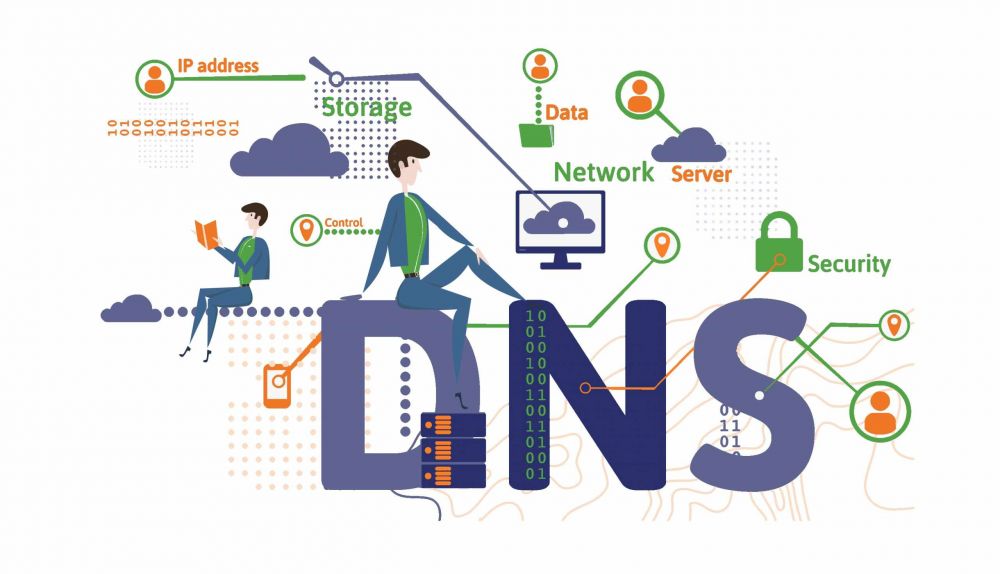Reading time: 6 min.

What is a DNS Server and How to Choose the Most Suitable Type
DNS stands for Domain Name System. DNS Server is a technology that allows a browser to find an IP address by name and load a website.
What is a DNS Server and What is it Used For
DNS is information exchanging protocol on the Internet. The DNS server is a place where the IP addresses of the websites are stored. When the user types the website name in the search box, the DNS server converts the domain name into an IP address and provides access to the website. Also the DNS server caches data. If the user has already visited a specific website, the DNS server saves the IP address and the site opens faster next time.
When Did The DNS Servers Appear and Where Are They Located

DNS servers first appeared in the United States of America in the early 1980s. There were originally 13 primary DNS servers or root servers. Over time, the DNS infrastructure has expanded to all continents. Later their copies or "mirror servers" were created to improve the resilience and reduce the load on the root servers.

Today there are hundreds of DNS servers in the world, which are mostly located in Europe (35%) and North America (32%). The more intensively we use the Internet, the more DNS servers are required to service requests.
Facts to Consider When Looking for a DNS Server
When choosing a DNS server, one should consider the server’s purposes and needs. DNS servers perform the following tasks:
- contain a database of IP addresses and domain names, delegate permissions to other DNS servers on the network;
- liaise IP addresses with subdomains and hosts for which the DNS server has authority.

The first task is performed by providers who host DNS databases in data centers. The second is performed by the root servers.

НIt is impossible to say for sure which server is better or worse, it all depends on one’s goals. If security is your top priority, choose a DNS server with enhanced data privacy protection. /p>
The most popular is the Google DNS server. It has high security, good speed, and reliable protection against hacker attacks. The Cisco Umbrella DNS Server for business is also highly reliable. Another leader among DNS servers is OpenDNS, which guarantees a high degree of filtration of malicious and unwanted content. Norton ConnectSafe and Neustar DNS servers have a fairly high level of security and protection against malware.
When choosing a DNS server, pay attention to the speed, which depends on the Internet provider, geographical location, and distance to the nearest physical server.
You can determine the speed of the DNS server by running a special program. One of the most popular programs for determining the speed parameters of the Internet is DNS Jumper, it is understandable and easy to manage.

- Google Public DNS is the most popular DNS server in the world. The advantages are resistance to DoS attacks, good privacy, and a free version. The disadvantage is complicated settings.
- Cloudflare is one of the fastest DNS servers according to DNS Jumper tests. The advantages include compatibility with all operating systems, great performance on mobile devices, high level of protection against hacker attacks. User data is not passed to third parties and is not used for advertising. The disadvantage is that the support team does not respond very fast.
- OpenDNS - is a public DNS server from Cisco. There are both paid and free versions. The commercial version has advanced functionality, in particular, it provides the ability to view Internet activity for a year, it is also possible to restrict access to certain websites. The paid version is suitable for commercial companies, and there is a free version for private users.
- Quad9 is a free DNS server with good speed. The advantages are a high level of protection against suspicious domains and DoS attacks, and blocking of phishing sites. The disadvantage is that sometimes safe domains are included in the list of suspicious sites, and it is difficult to install Quad9 on Linux OS.
- Verisign DNS is one of the ten most popular DNS servers in the world. The advantages of the server include a high level of data confidentiality, stable and secure operation, ease of use. The disadvantage is slower performance than previous DNS servers.
- Comodo Secure DNS is a popular and secure DNS server. The benefits are protection against unwanted ads, spyware and malware, phishing site blocking. The disadvantage is low performance, the server is only suitable for companies with small and medium volumes of transferred data.
All of the listed DNS servers have a good reputation, work great, and provide high security and good data transfer rates. Choose a DNS server based on your preferences and company goals.